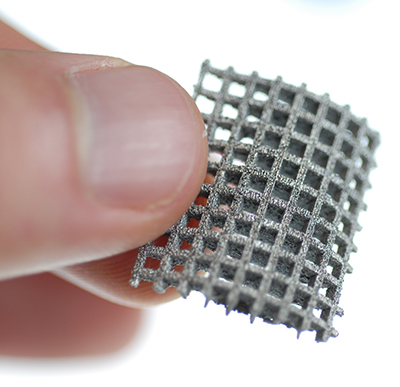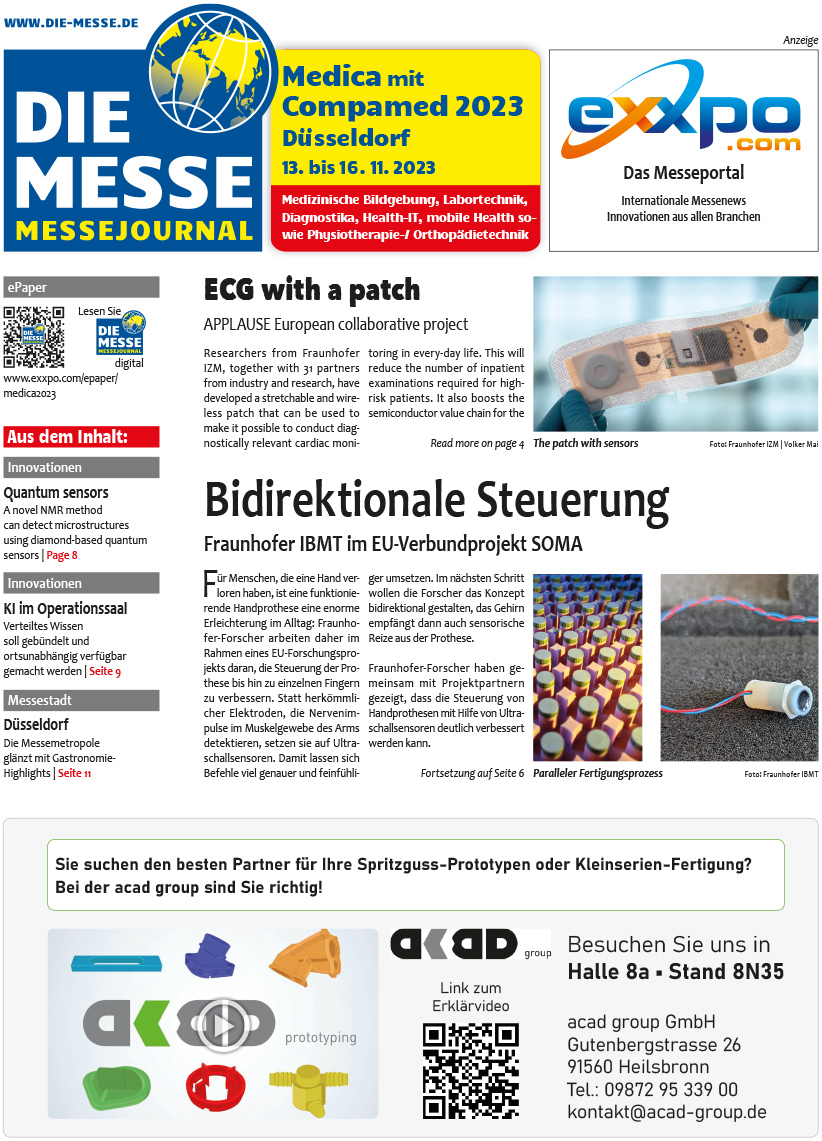9 November 2015
For this, scientists of the Surface Technology Group used a special form of 3-D printing – selective laser micro-melting (SLµM). They were able to coat electrodes for pacemakers with platinum, and produce three-dimensional lattice structures made of NiTi as well as stent prototypes made of stainless steel. Within this project platinum has been – for the first time successfully – processed within micro scale.
One way to lengthen the life of pacemakers is to intelligently adapt the form and surface of the electrodes. Platinum has excellent electrical conductivity characteristics, and it is bioinert. However, the metal has casting limitations, and it is hard to be worked on in the micro-range using conventional methods.
In the framework of this project, the scientists have developed an SLµM process for a platinum-iridium-alloy, and successfully coated implants. The shape memory alloy NiTi is already widely used in medical technology. Micro-implants made of NiTi offer new possibilities for making tailor-made stents, or bone replacements for patients. The scientists at the LZH have been able to successfully manufacture highly-complex, three-dimensional component structures made of NiTi. A resolution of up to 90 µm has already been reached for components, retaining all of the characteristics of the shape memory alloy.
The use of stainless steel 316 L for SLµM processes has already been established. Within this project, stent structures with a closed cell design have been developed and produced. Their mechanical characteristics are similar to those of conventional stents. The project was carried out together with the Institute for Biomedical Technology of the University of Rostock, as a subproject in the cooperative project “REMEDIS”. REMEDIS was supported by the German Federal Ministry for Education and Research (BMBF).
Printing implants with the laser
Whether for individual micro-implants or for micro-implants with medicine depots – additive processes are ideally suited for manufacturing such components. In the project “REMEDIS”, scientists at the Laser Zentrum Hannover e.V. (LZH) have established a highly automated laser melting process to produce or coat implants made of platinum, nickel-titanium (NiTi) or stainless steel.
 Photo: LZH Photo: LZHThree-dimensional structures made of the form memory alloy nickel-titanium using laser additive processes |
One way to lengthen the life of pacemakers is to intelligently adapt the form and surface of the electrodes. Platinum has excellent electrical conductivity characteristics, and it is bioinert. However, the metal has casting limitations, and it is hard to be worked on in the micro-range using conventional methods.
In the framework of this project, the scientists have developed an SLµM process for a platinum-iridium-alloy, and successfully coated implants. The shape memory alloy NiTi is already widely used in medical technology. Micro-implants made of NiTi offer new possibilities for making tailor-made stents, or bone replacements for patients. The scientists at the LZH have been able to successfully manufacture highly-complex, three-dimensional component structures made of NiTi. A resolution of up to 90 µm has already been reached for components, retaining all of the characteristics of the shape memory alloy.
The use of stainless steel 316 L for SLµM processes has already been established. Within this project, stent structures with a closed cell design have been developed and produced. Their mechanical characteristics are similar to those of conventional stents. The project was carried out together with the Institute for Biomedical Technology of the University of Rostock, as a subproject in the cooperative project “REMEDIS”. REMEDIS was supported by the German Federal Ministry for Education and Research (BMBF).
More news about "Medica":
21 September 2020
MEDICA and COMPAMED 2020 to be launched as ‘virtual.MEDICA’ and ‘virtual.COMPAMED’
MEDICA 2020 and COMPAMED 2020, the world-leading information and communication platforms for the medical technology industry and supplier industry for the medical technology industry, will take place entirely online from 16 to 19 November. Within the framework of 'virtual.MEDICA' and 'virtual.COMPAMED', decision-makers from all sectors of the healthcare industry can then expect a comprehensive range of products and services at virtual.MEDICA.de and virtual.COMPAMED.de consisting of three focal areas: The Conference Area (conference and forum program), the Exhibition Space (for exhibitors and product innovations) and the Networking Plaza (networking/ matchmaking). The next events, MEDICA 2021 and COMPAMED 2021, will be held as a hybrid event next year. The hybrid concept consists of combining live platforms for professional visitors to the Düsseldorf trade fair centre and digital offers. (more…)2 July 2020
The MEDICA, the world’s leading medical trade fair held in Düsseldorf, was one of the very first events across all industries to offer young companies in their founding phase special programme formats to present their concepts many years ago. It has subsequently become the international number one for health start-ups too. The creative and predominantly digitally driven start-up scene will be the centre of attention once again at MEDICA 2020 (run time: 16 to 19 November). This is because, following the Corona pandemic, mobile and easily applicable solutions for linking the actors in the healthcare system have become even more important. (more…)19 June 2020
Globally, no sector has been placed under the magnifying glass more than the healthcare sector due to the Corona pandemic. Hospitals, outpatient clinics, practice-based physicians and care facilities have experienced a sudden increased demand for medical and laboratory technology, a wide variety of medical products, digital health applications and, most of all, personal protective equipment. Under these conditions, the plans for the world’s biggest medical trade fair MEDICA 2020 and the number one trade fair for suppliers of the medical technology industry, COMPAMED 2020, held in parallel, are revving up to full throttle. Both events will take place from 16 to 19 November in Düsseldorf – closely interlinked with extensive digital offers and services. (more…)8 March 2019
Messe Düsseldorf India has acquired the FAMDENT Shows, one of the leading Indian fairs for dental medicine. This means the event will become a member of the MEDICAlliance, the umbrella brand for all global healthcare exhibition activities of the Messe Düsseldorf Group. (more…)28 January 2019
Medical Fair India with new “rehaindia” feature
From 21 – 23 February 2019 the Indian health industry elite will meet at the 25th Medical Fair India at the Pragati Maidon Exhibition Center in New Delhi. A new feature this year is rehaindia (powered by Rehacare) with ranges for rehabilitation and nursing care. (more…)
| FAIR NAVIGATOR PHARMA / MEDICAL TECHNOLOGY | |
|---|---|
|
| E-PAPER MEDICA |
 |
